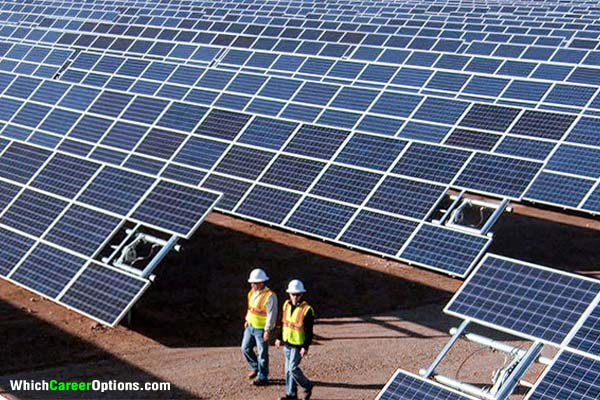What Does a Solar PV Installer Do? A Complete Career Guide
Discover what solar PV installers do, including key responsibilities, required certifications, salary expectations, and career growth in the renewable energy sector.

As the world shifts toward renewable energy, solar PV installers have become essential professionals in building our sustainable future. If your career quiz results suggest you enjoy hands-on technical work, problem-solving, and want to contribute to environmental solutions, this could be an ideal career path for you.
This comprehensive guide covers everything about becoming a solar PV installer – from daily responsibilities to long-term career prospects in this fast-growing green energy field.
What is a Solar PV Installer?
A solar photovoltaic (PV) installer (also called a solar technician) assembles, installs, and maintains solar panel systems on rooftops and other structures. These skilled professionals combine construction knowledge with electrical expertise to harness solar energy efficiently.
Key aspects of the solar PV installer role:
- Installs residential and commercial solar panel systems
- Works with solar arrays, inverters, and electrical components
- Follows strict safety protocols and building codes
- Often works outdoors at heights
- Contributes directly to renewable energy adoption
Key Responsibilities of a Solar PV Installer
1. System Installation
- Measure and assess installation sites
- Assemble mounting systems and solar panels
- Install electrical wiring and components
- Connect systems to the electrical grid
- Apply weatherproofing materials
2. Maintenance & Repairs
- Perform system inspections and testing
- Troubleshoot performance issues
- Replace damaged panels or components
- Clean solar arrays for optimal performance
- Update older systems with new technology
3. Safety & Compliance
- Follow OSHA safety guidelines for roof work
- Adhere to electrical codes and standards
- Use fall protection equipment properly
- Maintain clean and organized worksites
- Document installations for permits
How to Know If Solar PV Installation Is Right for You
Your career quiz may suggest this role if you:
✅ Enjoy hands-on, technical work
✅ Have good physical stamina and balance
✅ Like working outdoors
✅ Are detail-oriented and safety-conscious
✅ Want to contribute to environmental solutions
✅ Comfortable working at heights
If you’re looking for a growing trade career with purpose, solar installation offers excellent opportunities.
Skills & Qualifications Needed
Education & Certifications
- High school diploma or equivalent (minimum requirement)
- OSHA 10-hour construction safety certification (often required)
- NABCEP PV Installation Professional certification (gold standard, nabcep.org)
- Electrical training (apprenticeship or vocational program)
Essential Skills
✔ Basic electrical and construction knowledge
✔ Ability to read technical diagrams
✔ Physical fitness and comfort with heights
✔ Problem-solving and troubleshooting
✔ Attention to detail and safety protocols
✔ Basic math and measurement skills
Typical Career Path for Solar PV Installers
| Career Stage | Position | Key Responsibilities |
|---|---|---|
| Entry-Level | Installation Helper | Assists with basic tasks and learns fundamentals |
| Early Career | Solar PV Installer | Leads installations under supervision |
| Mid-Career | Lead Installer | Manages installation crews and complex projects |
| Senior-Level | Solar Project Manager | Oversees multiple installations and client relations |
| Advanced | Solar Business Owner | Runs own installation company |
Salary Range & Job Outlook
- Average Hourly Wage (U.S.): $18-$30/hour (U.S. Bureau of Labor Statistics)
- Average Salary (India): ₹3-6 lakhs annually
- Job Growth: 22% projected growth (2022-2032) – Much faster than average
- High-Demand Areas: States/countries with solar incentives and sunny climates
Key Terms & Definitions
- Photovoltaic (PV): Technology that converts sunlight into electricity
- Inverter: Device that converts DC solar power to AC for home use
- Net Metering: System that credits solar owners for excess power generated
- Array: Group of connected solar panels
- Racking System: Mounting structure for solar panels
Tips for Starting a Solar Career
🔹 Complete basic electrical training – Foundations are crucial
🔹 Get hands-on experience through apprenticeships
🔹 Obtain NABCEP certification – Increases earning potential
🔹 Develop roofing skills – Many installations are roof-mounted
🔹 Stay current with technology – Solar tech evolves rapidly
FAQs About Solar PV Installer Careers
1. How long does it take to become a solar installer?
Most can start in entry-level positions within months, while becoming a lead installer typically takes 1-3 years of experience.
2. Is this a seasonal job?
While busier in warmer months, many companies now offer year-round work with maintenance and indoor installations.
3. What’s the difference between solar thermal and PV installers?
PV installers work with electricity-generating panels, while thermal installers work with sun-powered water heating systems.
4. Do I need to be an electrician first?
While helpful, it’s not required – many learn electrical skills through solar-specific training programs.
Career Limitations to Consider
⚠ Weather-dependent work (extreme heat/cold, rain delays)
⚠ Physical demands (lifting, bending, roof work)
⚠ Potential seasonal fluctuations in some markets
⚠ Need for ongoing training as technology evolves
Final Thoughts
A career as a solar PV installer offers the chance to be part of the renewable energy revolution while developing valuable technical skills. If your career quiz highlights your mechanical aptitude, environmental values, and desire for hands-on work, this growing field could be your ideal path.
With solar energy adoption accelerating worldwide, skilled installers will remain in high demand for years to come. Ready to harness the power of the sun? Start exploring training programs in your area today!
